One year on: Bittersweet journeys to safety
The day Russian forces invaded, February 24, 2022, left many Ukrainians in disbelief.
Across the country, a relentless military campaign targeting Ukraine’s cities marked the beginning of a conflict that would see the world’s fastest-growing refugee crisis since World War II.
Millions have since fled Ukraine, taking little more than the clothes on their back and a bag or two. Most are women and children, as men aged between 18 and 60 have been instructed to remain and fight.
Holding an object they took with them, these are the stories of Kateryna, Jarda, Roman, Julia and Maria, who made the bittersweet journeys to safety, to the United Kingdom, Czech Republic, United States, Romania and Poland, respectively.
Kateryna
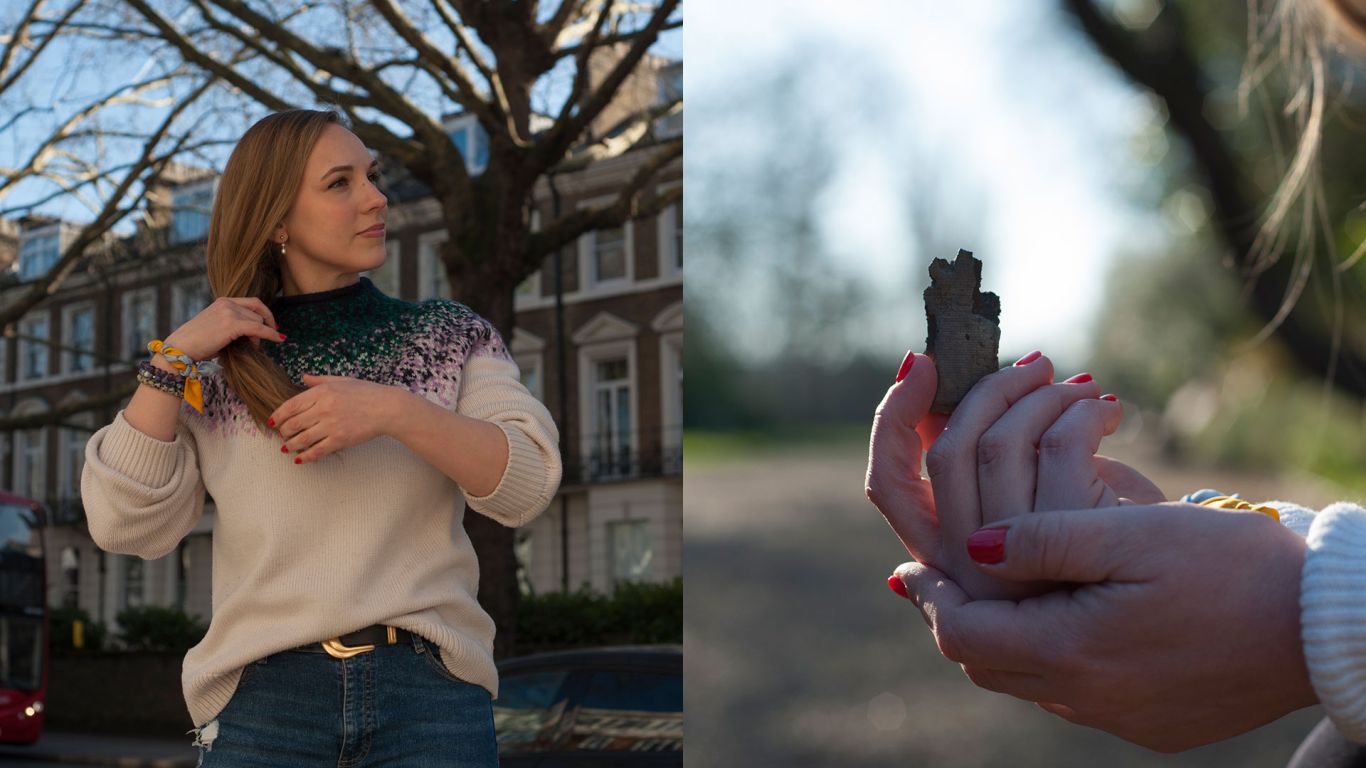
Kateryna Miakutikova, 34, hails from Nemishajeve in the Kyiv District.
She fled to Poland days after the war began. She now lives in west London, where she regularly visits the Ukrainian Social Club with her two children.
On the first day the war started, we couldn’t believe it.
“At first, we thought this is Kyiv District, we’re safe here. I asked my friends if they could evacuate me and my kids, but they couldn’t, because, from all sides, Russians were everywhere," she said. "On the first day the war started, we couldn’t believe it."
“It was dangerous because we went through Russian block posts - they looked through our phones, our cars. If they found something provocative or patriotic they would not let us go. We spoke to them in Russian, but this neighbour who was driving spoke only Ukrainian.
“I saw dead bodies on the road and my kids saw them, too. The tanks stayed on the road with the guns pointed on our cars. I was calm because I understood that I was with my kids and if I panicked, they would panic. In this situation, your instincts work.”
Kateryna and her children were dropped off in Zhytomyr, west of Kyiv, where they stayed one night with friends. From there, she took a 12-hour evacuation train to Lviv.
My daughter took a piece of a rocket. The kids were playing in the apartment complex and found this.
“You go because you need to go somewhere. In Lviv, I heard my first siren, and I didn’t know what to do. It was a strange feeling because I had never heard it before.
"I told my kids to just trust me, that we will be OK. When we got to London, we stayed in one room in Notting Hill with our sponsors, Georgina and Alistair, for eight months.”
She is holding a piece of a Russian missile.
“I didn’t see this until we arrived in Poland," she said.

“My daughter took a piece of a rocket. The kids were playing in the apartment complex and found this. Thinking about the rocket, you understand how powerful it is when it explodes - if this piece were to go inside your body, how big a hole it could make.
"I tell you, I was lucky in the whole situation.”
Sitting on a park bench, Kateryna feels compelled to write in her notebook.

"I am very grateful to God and the universe for protecting me. I also thank my family and relatives, who are always with me in my mind and in my heart. Thanks to all the people who have helped and are helping me in my life. I believe that I have a mission that supports me and guides me through life. Peace and goodness to all! We will not allow them to intimidate us and lose faith in the future. To live against everything and everyone."
One-third of Ukrainians displaced
One-third of Ukrainians have been forced from their homes, one of the world's largest human displacement crises.
According to the UN refugee agency, UNHCR, there are more than eight million refugees across Europe and some six million internally displaced within Ukraine.
The EU has granted Ukrainians the right to stay and work for up to three years in the 27-member state area.
Two-thirds of refugees registered in Europe are in just three countries: Poland, Germany and Russia. It is estimated that 90 percent are women and children.
Jarda
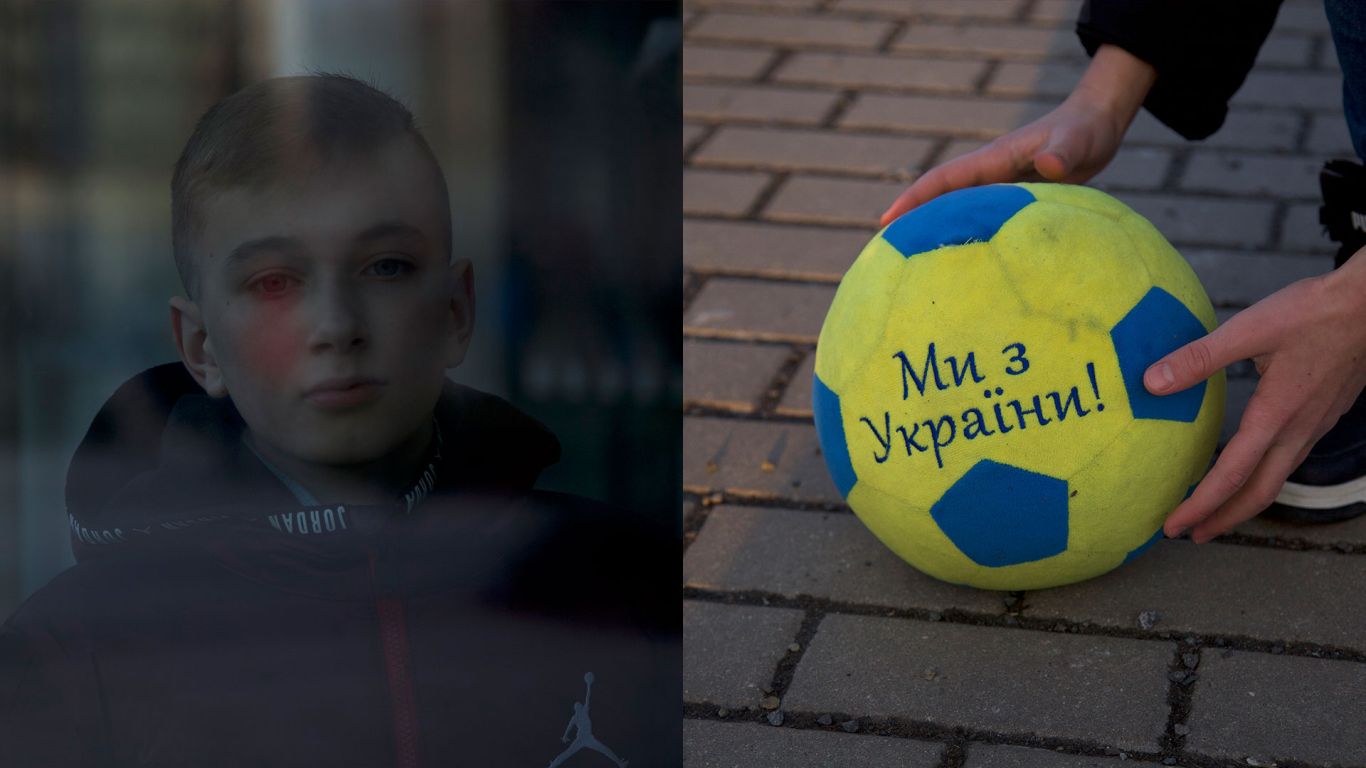
Eleven-year-old Jarda Mozgan, a boy from Kyiv, remembers the first day of war.
“The first bombing started just as our buses got to Wroclaw [Poland]. The TV in the hotel room showed footage of what was happening back home. It was horrible. It was wrong," he said.
"I brought this football with me because I have been playing football since I was three years old. I want to be a football player when I grow up."
Back in Kyiv, we had a lot more room to kick the ball around.

"The ball comes with me everywhere I go, because it is soft and I can play with it inside. My mum got it for me while we were still in Kyiv. It reads 'We are from Ukraine.'
"Back in Kyiv, we had a lot more room to kick the ball around, but here in Prague, we only have one room to play with my brother.
"The ball came with me to Wroclaw. I went there the night the war started for football training. I was only meant to stay for a few days before going back to my family in Kyiv. Instead, it took a month before I saw my parents."
Jarda travelled more than 1,200km (750 miles) from Kyiv, through Poland, before settling in the Czech Republic.
Roman
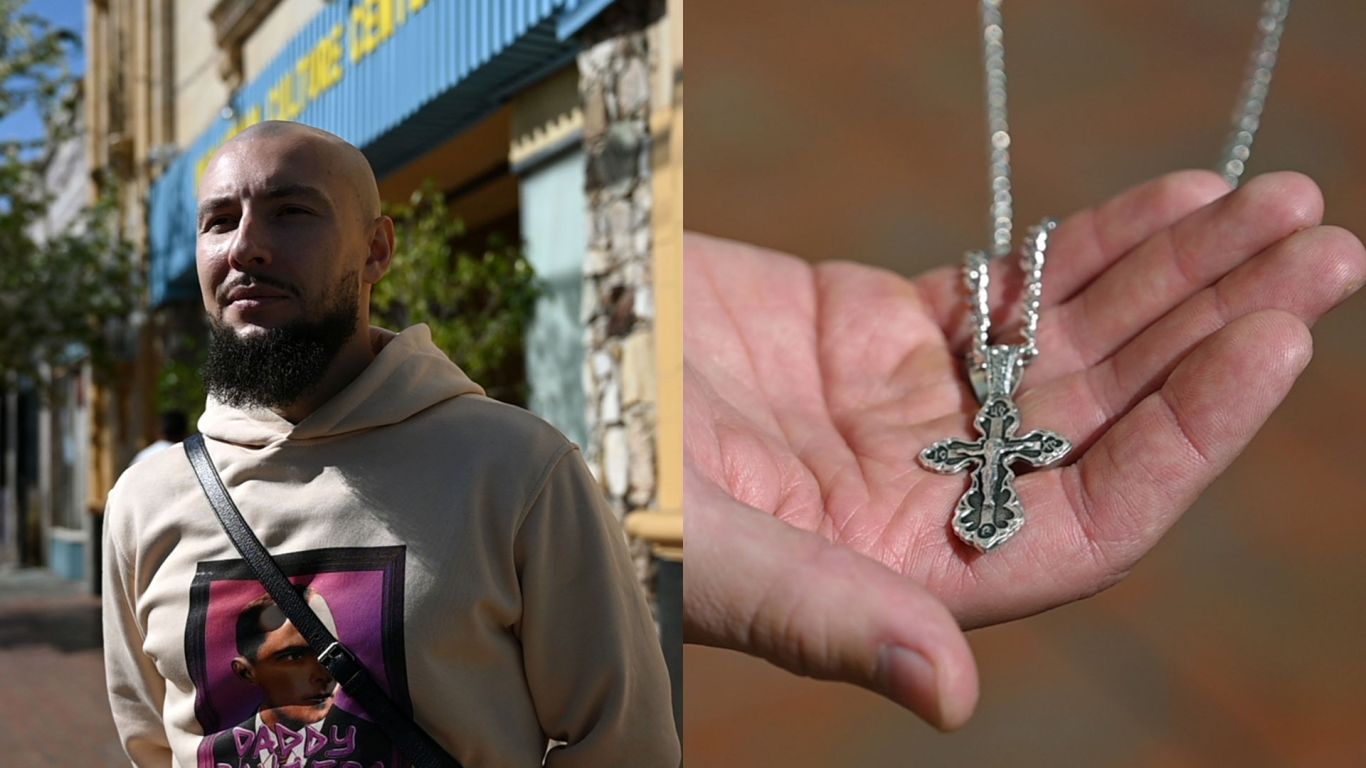
“We were on vacation in Dubai for one week, and two days before heading back to Kyiv, the war started and we could not fly back,” said Roman Shynkarenko, who now lives in Los Angeles.
“We stayed for several weeks in Dubai, because each week we were trying to understand where do we go, and how do we go.
"After another three weeks, we headed to Portugal, near Lisbon, and stayed there for three and a half months. When the United States opened their United for Ukraine programme, we went straight to the US, to Los Angeles."
He said looking after their children in a foreign place as the war was raging at home, with no usual helping hands like a grandmother's, added pressure.
"It was challenging with the kids, but it was good for our relationship. We know them better now.
"For the first couple of months, it was crazy to balance work and find a kindergarten for them, first in Portugal, and then in the US. This unexpected immigration was forced on us, and it was very hard to adapt at first."
This chain and cross are dear to me as a memory more than the jewellery itself.
"My mother melted her old jewellery partially to get me this neck chain as a birthday gift . The cross for this chain I bought much later in Kyiv Pechersk Lavra (the historic Kyiv Monastery of the Cave), specifically because I was asked to be a godfather for my future godson, Alexander, who’s now in Poland with his mum and younger brother. His dad serves in the Ukrainian army.
"This chain and cross are dear to me as a memory more than the jewellery itself. Too many heartwarming memories associated with them."

Julia
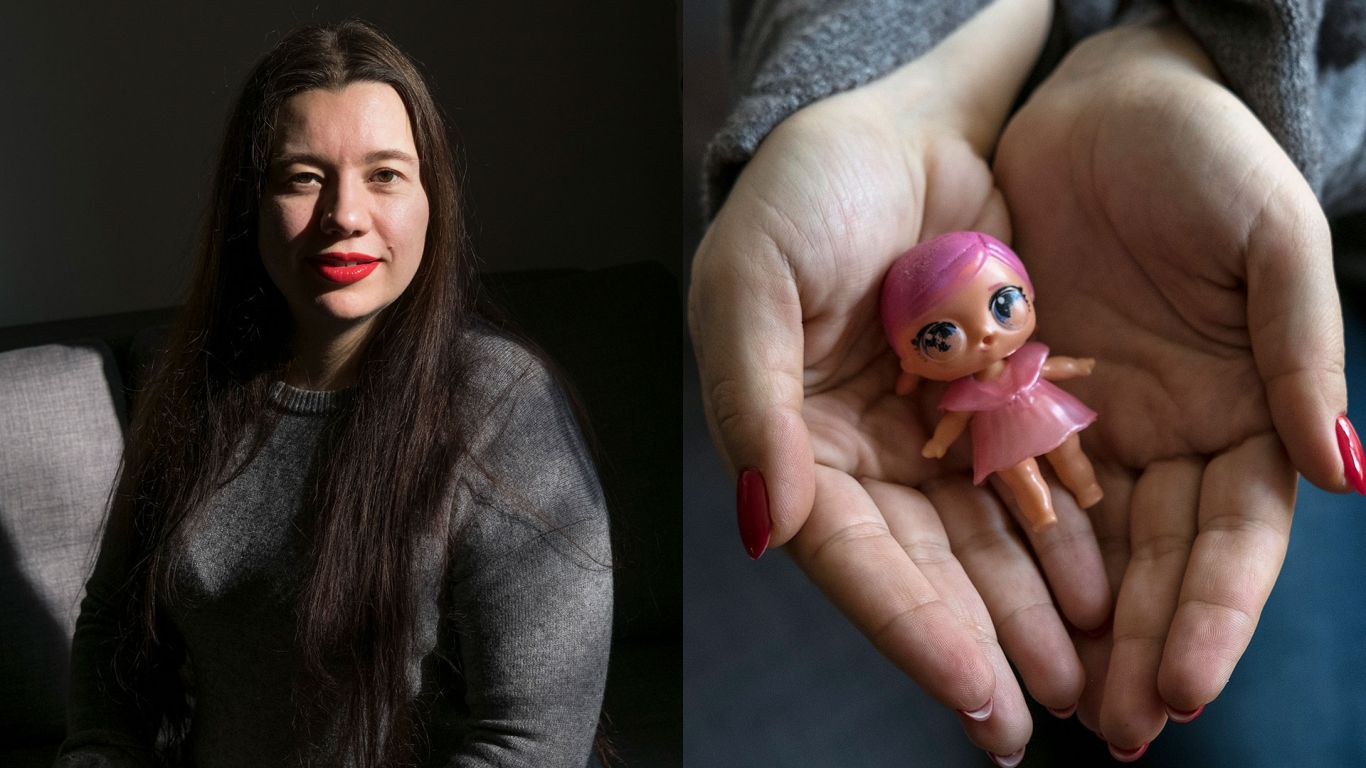
Julia, 35, a psychologist from Mykolaiv, arrived in Romania on March 13, 2022.
"We saw a lot of bombing from the window of our house. We had only 30 minutes to pack our luggage, then we took our car and left," she said.
Amalia never leaves home without it.
She travelled with her husband and their four-year-old daughter, Amalia. They drove from Mykolaiv to Odesa, from there to the Isaccea border crossing to Romania, then to Bucharest, in a 24-hour trip.
A few days before leaving, she had severe back pain.
“I had a pillow behind my back while driving. At the border, you need to leave your car so they can check. I managed to get out of the car, but then I couldn't get back in.
“We took two bags, almost everything for her [Amalia], her toys, her clothes. She has autism. They usually choose one or several toys and take them everywhere. We took her favourite doll, her name is Super Bibi. Amalia never leaves home without it.
"If we forget to take it, we have to go back for it. She eats special food, so her food, one small bag for myself, and one small bag for my husband. We planned to go abroad for one, maximum two weeks."

While trying to find therapy for Amalia, Julia met other Ukrainian children with additional needs in Romania. A psychologist, Julia started volunteering to help her community.
“I work with kids with autism and Down syndrome from Ukraine. I know around 40 mothers with children with autism and they can't get any support because in Romania, in these centres, people don't know Russian or Ukrainian. For small kids, the problem is they don't speak English. So there is no other option than to work with me."
Currently, Julia offers one-on-one therapy sessions to 10 Ukrainian children with additional needs.
In her schedule, which she describes as “crazy, crazy, busy, busy”, she still finds time to help those back at home.
“No time to stop at all," she said. "I have 400 people in Mykolaiv who I help, my whole apartment is full of boxes."
Maria
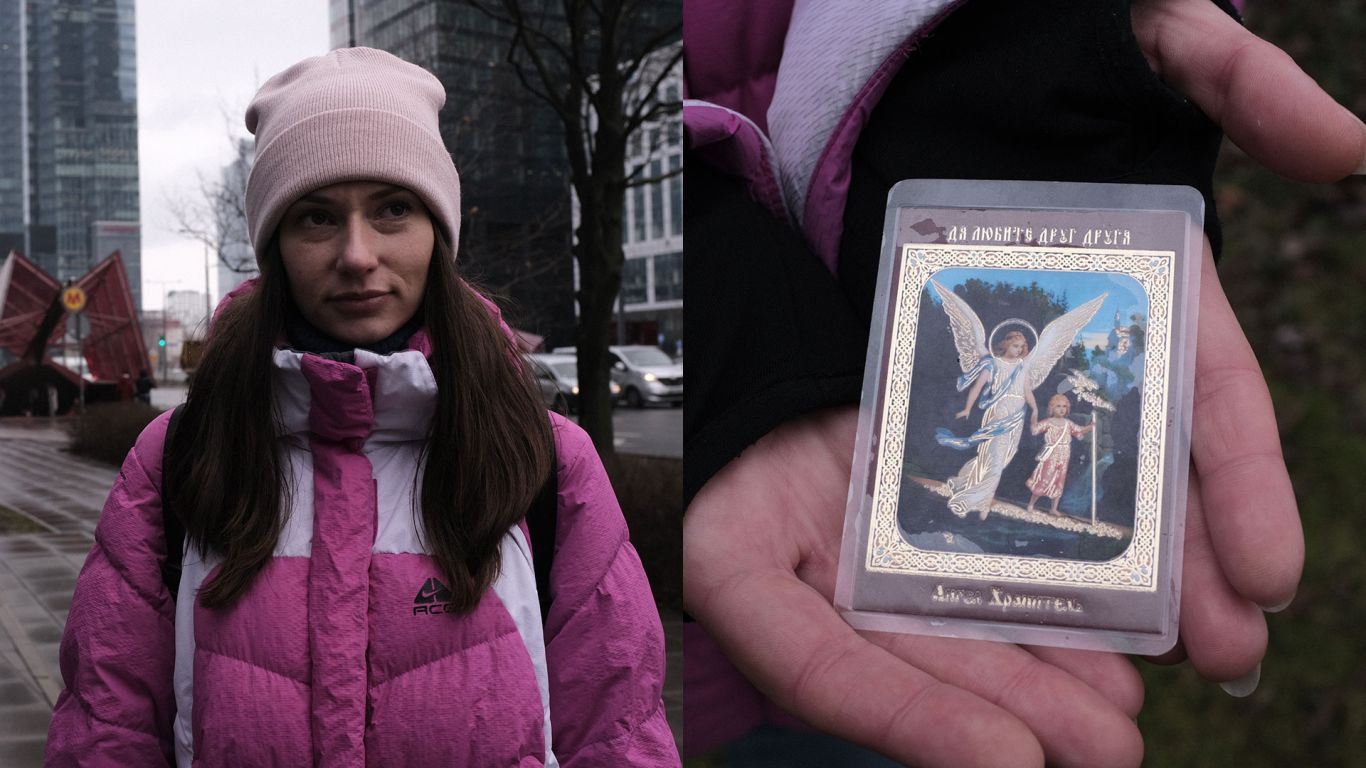
This is the second war that has forced Maria Prokopenko from her home. She fled from Donetsk in 2014, after parts of the eastern region were taken over by Russia-backed separatists.
On February 24, 2022, Maria huddled together in a bomb shelter in Irpin, near Kyiv. They stayed for 10 days.
On March 5, Maria escaped with her husband and five-year-old son Alexander, who has additional needs.
They drove to the Irpin bridge, caught an evacuation bus to Kyiv and travelled by train to Vinnytsia. They stayed with relatives for two weeks before travelling to Otaci, Moldova, by car.
From Moldova, they travelled to nearby Romania and later Bulgaria.
In Varna, the family was put up in a hotel, but it was a struggle keeping Alexander's medication refrigerated.
They took a bus to Bulgaria's capital, Sofia and on March 28, flew to Warsaw, Poland. Maria’s husband has since returned to Ukraine.
For Maria, faith is important.
"When we were in the bomb shelter, we were praying nonstop: 'Heavenly Father, Heavenly Father ...' Thinking about everything that has happened, it was with the help of God [that we survived]," Maria said.
"My husband knows the specifics of the Grad [rocket launcher] system. They are firing rockets, but he said that after 10 minutes, there’s a break. Because we only had 10 minutes [to flee], I only took the most necessary stuff. Clothes, food for my son. It was automatic. I just dropped everything I saw into a bag.
"After that day, I am praying every day, thanking my guardian angel that he took care of us, took me by the hand and showed me the safe road.
"It’s a personal decision. Some have crosses, others have icons – it’s part of our culture. We’ve been praying to God to take care of us."
We’ve been praying to God to take care of us.
